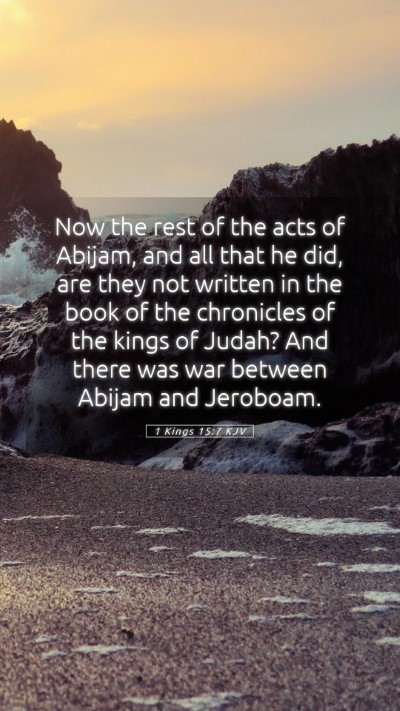Bible Verse Commentary: 1 Kings 15:7
Verse: "Now the rest of the acts of Abijam, and all that he did, are they not written in the book of the chronicles of the kings of Judah? And there was war between Abijam and Jeroboam." (1 Kings 15:7, KJV)
Understanding 1 Kings 15:7
This verse serves as a historical note concerning King Abijam of Judah, providing a glimpse into the turbulent times during his reign and his conflict with Jeroboam, the king of the northern kingdom of Israel. The mention of the "book of the chronicles of the kings of Judah" indicates that this information is a summary of a larger historical account.
Commentary Insights
-
Historical Context:
According to Matthew Henry, this verse emphasizes the importance of historical documentation during the reigns of the kings, where the writer refers to a chronicled account that would have recorded significant events. It provides a link to the history of Israel, illustrating the ongoing rivalry between the kingdoms of Judah and Israel.
-
Thematic Significance:
Albert Barnes notes that the phrase "the rest of the acts of Abijam" indicates that while some information about Abijam is provided, much remains unwritten, urging readers to consider the selective nature of recorded history. This observation underlines that not everything a king did was deemed significant enough for posterity.
-
Conflict and Rivalry:
Adam Clarke highlights the continual conflict between Abijam and Jeroboam as a pivotal aspect of this verse. This rivalry serves to set a backdrop for understanding the political and spiritual struggles of the time, where ideological differences often translated into physical confrontation.
Bible Verse Meanings
This verse encapsulates a few key themes relevant in understanding Scripture:
- Legacy of Leadership: The acts of leaders are often scrutinized and remembered based on their significance, as seen through the lens of Biblical exegesis.
- Chronicling History: The reference to the chronicles serves an important function in theology, showcasing how history was recorded and preserved for future generations.
- Divine Sovereignty: The conflicts between kings often illustrate God’s sovereign rule over nations, as He directs the course of history through those in authority.
Cross References
To further enrich your Bible study insights, consider examining the following cross references:
- 2 Chronicles 13:1-2 - A parallel account of Abijam's reign.
- 1 Kings 14:30 - Context regarding Israel’s wars during this era.
- 1 Kings 12:28-31 - Introduction to Jeroboam and his policies.
Applying Bible Verses to Daily Life
The significance of this passage extends beyond historical recounting. It allows readers to consider how:
- Decisions made by leaders affect the course of community life.
- Understanding the past informs the present, especially regarding faith and governance.
- The importance of recording and reflecting on our actions to create a legacy.
Conclusion
1 Kings 15:7 may appear as a brief historical remark but it holds depth in illustrating the conflicts of leadership, the importance of documented history, and God’s sovereignty in guiding nations. For interested readers, this adds to the broader framework of understanding Scripture and provides valuable insights for personal application in the areas of leadership, conflict-resolution, and historical context.


